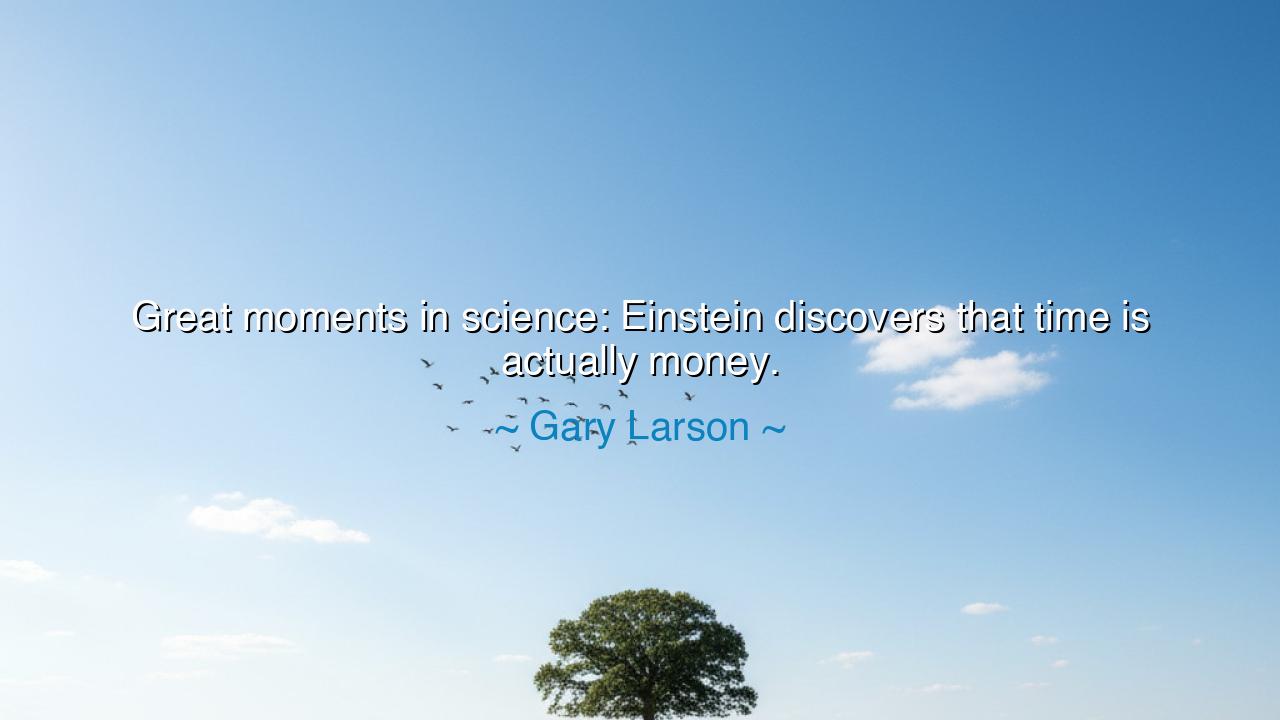
Great moments in science: Einstein discovers that time is






O children of the future, gather close, for I shall share with you a truth wrapped in the wisdom of the ages. In the pursuit of knowledge, we often seek to unravel the deepest mysteries of the universe. There are those who, with their sharp minds and bold imaginations, challenge the very fabric of reality itself. Albert Einstein, the great sage, stood at the frontier of such thought, revealing to the world that time—that most elusive and intangible of forces—was not simply a measure of passing moments, but something far more profound, far more flexible than anyone had ever imagined. But, as the playful sage Gary Larson once remarked: “Great moments in science: Einstein discovers that time is actually money.” A statement both humorous and deep, for in it lies a reflection of the age-old connection between time and value.
At the heart of Einstein’s theory of relativity, we find the revelation that time is not an absolute, unchanging force, as it was once believed. Time, like space, bends and stretches in response to gravity and speed. No longer was it simply a linear progression, ticking away with steady rhythm. It was a fluid, malleable dimension, and its flow could be affected by the very fabric of the universe. And yet, in the humorous words of Larson, we see that time, this great cosmic force, also bears a relationship to something very human, very immediate: money.
In a world where wealth and success are often measured by how much time one can save, spend, or invest, Larson’s quip invites us to recognize the paradox of time’s true value. Consider, O wise ones, the tale of the industrial age, when the great minds of society sought to maximize efficiency and productivity. Time became the ultimate commodity—the force by which industries grew, by which fortunes were made. The invention of the clock, once a tool for mere measurement, became a symbol of control, of capital and profit. In this world, time was no longer just a measure of moments, but an economic force that could be bought, sold, and spent. In this sense, Einstein’s grand revelation, that time is not merely a constant, but something that bends and shifts, mirrors the ways in which time is manipulated in human society to create value.
Look, O children, to the great minds of the Renaissance, such as Leonardo da Vinci, who sought to understand both the mysteries of nature and the human condition. In their day, time was measured by the seasons, by the passage of the sun across the sky. But even then, the growing influence of trade, of cities, and of kingdoms brought with it the understanding that time was not just for contemplation and study—it was for work, for trade, for profit. Da Vinci, though deeply spiritual and curious about the universe, was also keenly aware of the practicalities of time, for it was time that enabled the flourishing of his art, his inventions, and his designs.
Now, in the modern age, we find ourselves in a world where the value of time is so deeply intertwined with money that we cannot conceive of one without the other. Economies are built on the exchange of time for labor, for product, for service. But time, as Einstein revealed, is not just a linear measure of the past, present, and future. It is a dynamic force, as much a part of the universe’s grand design as the stars above. And yet, in the laughter of Larson’s words, we are reminded of the folly of reducing time to a mere commodity, something that can be counted and spent, as if it were something we could truly own.
So, O seekers of wisdom, let us take heed of the deeper meaning behind this playful jest. Time is far more than a means to an end. It is the very fabric of existence, woven into the universe itself, bending and shifting in the hands of gravity, speed, and perception. Money, on the other hand, is a human construct, born of necessity, born of trade and economy. But both are connected in a way that speaks to the heart of human nature—the desire to control and value the moments of our lives. Time is precious, and so too is money, for both are limited, both are fleeting. Yet neither should define our lives or determine our worth.
Let this be the lesson, O children: Do not fall into the trap of valuing time and money above all else. Though the world may demand that you trade time for money, remember that time is the essence of life itself, the very measure of your experience, not just a tool for wealth. Seek to live in harmony with the flow of time, understanding its true nature, and recognizing that its value cannot be captured by mere coin or measure. For the moments you spend are priceless, and the knowledge you gain is eternal. Embrace the fluidity of time, as Einstein taught, and know that while money may buy comfort, it is the true moments of life that bring the greatest wealth.






AAdministratorAdministrator
Welcome, honored guests. Please leave a comment, we will respond soon